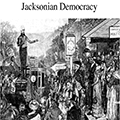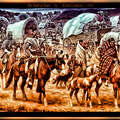Introduction
Andrew Jackson, the 7th president of the United States, is viewed as either the champion of the common man or a tyrant who ignored the democratic system for personal gain and achievement. Though Andrew Jackson viewed himself as the champion for the people; however, his actions, along with his methods, hurt the common man, increased the division in the country, and lessened the value of the constitution that was written for the people, therefore, making Jackson a tyrant rather than a defender of the common man. To understand why Jackson was a tyrant, it is necessary to know the time and how he became such. The policies of Jackson and his demeanor as a leader began to develop at a young age.
Early Life and Ideological Formation of Andrew Jackson
Andrew Jackson was born on March 15th, 1767, near the North and South Carolina border. (Remini) Jackson’s education was very poor, only briefly taking an interest in reading before he dropped it in favor of hobbies he found more interesting. This lack of a formal education stuck with him his entire life as he never formally studied law or politics despite eventually becoming a lawyer and a politician. The part of Andrew Jackson’s childhood which truly shaped his personality and early ideals was the Revolutionary War. He was nine years old when the declaration was signed, and soon the war reached his family. Andrew Jackson’s hometown, Waxhaws, was massacred by the British as he sought shelter in the Waxhaw church. The Waxhaw massacre led both Jackson and his brothers to join patriots fighting the British.
The war for independence eventually led to the death of all his brothers, along with their mother. This developed a personal hatred for Great Britain and Europe from Andrew Jackson. As Spencer Tucker states, “These events no doubt influenced Jackson’s subsequent hatred for the British.” [footnoteRef:1]The hardships Jackson faced in the revolution led him to become the stubborn idealistic leader he came to be and his step ladder into the military and the political world.
Research Paper of Andrew Jackson
Andrew Jackson started his career in law and politics in Tennessee along with a plantation with around 150 slaves. However, he soon found himself leading a Tennessee militia during the War of 1812 and The Creek War. The Siege of New Orleans established Jackson as the war hero now known as Old Hickory.[footnoteRef:3] Jackson was gaining power fast, and people began to worry; as Remini puts it, “In some political circles, there was a genuine fear that the country had produced another Napoleon who would in the future extinguish liberty and abrogate the rights of American Citizens.”[footnoteRef:4] As a result of his new status, President Monroe entrusted the task of dealing with the slaves escaping to Florida along with the Indians, which continued to cause problems for Georgia and The Mississippi territory.
Jackson did what he was tasked with and captured East Florida. Yet Jackson also executed two British nationals and, while conquering East Florida to deal with the Seminoles, additionally set up military offices and provisional governments, which were not authorized by The United States, thus preluding Jackson’s tyranny. This created an international crisis between Spain and the United States of America (USA). This crisis was only the prelude to Andrew Jackson’s tyrannical actions and abuse of power. Washington planned on returning Florida to Spain, which infuriated Andrew Jackson, who soon found himself a rival in Henry Clay. President Monroe and John Quincy Adams managed to negotiate a deal with Spain and bought Florida from Spain after Jackson was awarded the governance of Florida for his actions, but soon after, Jackson set his sights on the presidency.[footnoteRef:5]
Argumentative Essay Examples of Andrew Jackson
Jackson deviates from protector of the American common man to a power-hungry tyrant with a misguided and stubborn agenda in this search for power. [3:. Meacham, 27-32] [4: . Remini, Robert Vincent. Andrew Jackson. (Baltimore: Johns Hopkins University Press, 1998), 160] [5:. Remini, 157-174]
Jackson ran for the US Senate as a representative of Tennessee to prepare for his run as President. However, when the Election of 1824 came, Jackson could only secure a plurality. Thus, the election had to go through the House of Representatives, putting Jackson and the other 3 candidates on equal ground. Jackson’s rival and his adversary for the presidency, Henry Clay, began to rally support for presidential candidate John Quincy Adams leading to the House electing Adams as president-elect. Jackson was fine with this until he learned Adams appointed Henry Clay. Jackson immediately condemned this as a corrupt bargain. Furious, Jackson immediately started prepping for the election of 1828.[footnoteRef:6] Jackson began to support a tariff to rally support from voters of the western states. By doing so, Jackson betrayed the party and the people he was representing in the southern states.
Thesis Statement of Andrew Jackson
The southern states vehemently opposed the new tariffs, but this didn’t concern Andrew Jackson as he knew they would not vote for the opposing party. His support for this tariff is a perfect example of how power-hungry Jackson became in his pursuit to force his stubborn agenda on America. Jackson also formed an alliance with Calhoun and his party to help secure the White House. This coalition shows hypocrisy on Jackson’s side as he previously called Clay’s appointment a corrupt bargain despite also being an alliance under the democratic system that Jackson claimed to be fighting for.[footnoteRef:7] According to Meacham, “The force driving Jackson … a belief in the primacy of the will of the people over the whim of the powerful.”[footnoteRef:8] But Jackson had become powerful and would force his whims and ideas on the people, for better or worse. [6:. Meacham, 39-46] [7: . Meacham,42-46] [8: Meacham, 46]
Ideas on The Nullification Crisis and Hypocrisy of Jackson
Jackson was victorious in the election of 1828; he gave much power to the common man and carried through on his campaign promises; however, these changes from the tyrant hurt the common man more than they aided them. The campaign of 1828 also had a cost to it; defamation of each candidate’s personal life was brought to a whole new level. A tradition that would scar the political environment with defamation in America for many subsequent elections. This defamation wasn’t just about the other candidate; it got into those around the candidate as well. Jackson’s wife was the target for much of the campaign as they wed while she had vows to another man.
The Scarring Campaign: Personal Attacks and the Death of Rachel Jackson
This affected Rachel Jackson’s health dramatically until she eventually died of a heart attack. Andrew Jackson pinned the blame of her on Clay and his defamation of her, and as a result, Jackson became less trusting and more tenacious. Another problem Jackson brought to the White House was severe patronage. He rewarded those who supported him in the election with federal posts, qualified or not. This reward system, which Jackson called rotation in office, made the government-run with less efficiency and affected the common man in a negative fashion.[footnoteRef:10]
Another issue that arose during Jackson’s administration was his veto of the National Bank of the USA. Jackson kept a personal vendetta for the National Bank since the panic of 1819, which hurt the common man because of the loose monetary policy that caused price chasing for land. However, the loose monetary policy was mainly the fault of the State Banks as the National Bank was only recently granted its 2nd charter at the time. Andrew Jackson did not want to adhere to the democratic system and wait until the charter of the National Bank expired. Instead, Andrew Jackson abused his power as President to take all the currency out of the National Bank in September 1833.
That act, along with the National Bank’s retaliation, led to another economic crash for the United States as the state banks took power again with a loose monetary policy. The common man suffered economically from this direct action of Andrew Jackson.
The Indian Removal Act: Trail of Tears and Disregard for the Supreme Court
The strong division in America was deepened by the actions of Jackson’s policies during his presidency, making Jackson’s position as the defender of the common man all the weaker. Because of the tariff of 1828 that was supported by Andrew Jackson, a crisis of nullification was started. South Carolina could not keep up with the tariff because of the Panic of 1819. The tariff that Jackson supported profited the rich factory owners in New England on the hardships of The Southern states, according to Calhoun and the South Carolina government.
As a result, South Carolina planned on using the power of nullification to void the tariff or possible secession. Despite Andrew Jackson being an advocate for the common man and the power of the states, Jackson opposed the nullification believing it would cause disorder. The crisis was avoided by Andrew Jackson’s strong opposition and threat of war, along with Henry Clay quickly presenting a compromise. However, the nullification crisis exemplifies how his policies did not benefit the common man, along with his hypocrisy toward the State’s rights.[footnoteRef:12]
Following Andrew Jackson’s tyranny. His Indian Removal Act of 1830 created another deep scar within the nation that would have lasting effects. Andrew Jackson himself calls the removal a “… benevolent policy of the government … .”[footnoteRef:13] This benevolent policy created the event known as the Trail of Tears, where 4,000 Cherokee refugees died, making the journey to the relocated land forever scarring the United States with their deaths. To make matters worse for Jackson, the Supreme Court ruled in favor of the Cherokee Indian’s right to stay in their land; However, Jackson defied the checks and Balances in the Constitution and did not enforce the Supreme Court’s decision.
The disregard of the law for the people made by the founding fathers can make Jackson nothing but a tyrant, let alone a defender of the common man[footnoteRef:14] [12: Shi and David, 438-439] [13: Spencer C. Tucker ‘Andrew Jackson, Indian Removal Messages to Congress, 1829–1830.’ In The Encyclopedia of North American Indian Wars, 1607-1890: A Political, Social, and Military History, 2011)
Conclusion
From stark beginnings, Andrew Jackson began his rise to the top in pursuit of the defense of the common man and for the sake of the country. Through self-learning and determination, Jackson climbed to the top as a war hero and eventually the President. Yet, in the pursuit of power to achieve his goals, Jackson began to abuse his power and reputation to achieve what he thought must be done and blinded himself from how it affected the common man he was supposed to represent. Bringing them to an economic crisis, the stubbornness of the National Bank, the increased division in the nation because of his lust for power causing the Nullification crisis, and his abuse of power and disregard for the constitution in the Indian Removal Act makes it clear that Andrew Jackson was not a defender of the common man, but a tyrant who only saw fit to achieve his goals.

